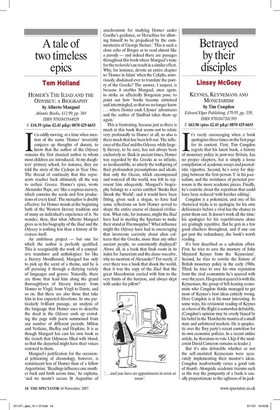A tale of two timeless epics
Tom Holland HOMER'S THE ILIAD AND THE ODYSSEY: A BIOGRAPHY by Alberto Manguel Atlantic Books, £12.99, pp. 304 ISBN 9781843544029 © £1039 (plus £2.45 p&p) 0870 429 6655 1 t is oddly moving, at a time when mention of the name 'Homer' invariably conjures up thoughts of donuts, to know that the author of the Odyssey remains the first classical author to whom most children are introduced. At my daughters' primary school, for instance, they are told the story of the Cyclops in Year One. The thread of continuity that this represents reaches back ultimately all the way to archaic Greece. Homer's epics, wrote Alexander Pope, are 'like a copious nursery, which contains the seeds and first productions of every kind'. The metaphor is doubly effective: for Homer stands at the beginning both of the Western literary tradition and of many an individual's experience of it. No wonder, then, that what Alberto Manguel gives us in his biography of the Iliad and the Odyssey is nothing less than a history of literature itself.
An ambitious project — but one for which the author is perfectly qualified. This is recognisably the work of a compulsive translator and anthologiser: for like a literary bloodhound, Manguel has only to pick up the scent of a theme, and he is off pursuing it through a dizzying variety of languages and genres. Naturally, there are those that lead him along the grand thoroughfares of literary history: from Homer to Virgil, from Virgil to Dante, and so on. But there are also those that take him in less expected directions. In one particularly brilliant passage, an analysis of the language that Homer uses to describe the dead in the Odyssey ends up crowding the page with poets summoned from any number of different periods: Milton and Verlaine, Shelley and Hopkins. It is as though Manguel has cast his own book as the trench that Odysseus filled with blood, so that the departed might have their voices restored to them.
Manguel's justification for the occasional jettisoning of chronology, however, is reminiscent less of Homer than of a fellow Argentinian. 'Readings influence one another back and forth across time,' he explains, 'and we mustn't accuse St Augustine of anachronism for studying Homer under Goethe's guidance, or Heraclitus for allowing himself to be prejudiced by the commentaries of George Steiner.' This is such a close echo of Borges as to read almost like a parody — and indeed there are passages throughout this book where Manguel's taste for the recherché can result in a similar effect. Why, for instance, devote an entire chapter to 'Homer in Islam' when the Caliphs, notoriously, disdained ever to translate the poetry of the Greeks? The answer, I suspect, is because it enables Manguel, once again, to strike an affectedly Borgesian pose: to point out how 'books become entwined and intermingled, so that we no longer know . . . where Homer ends Ulysses' adventures and the author of Sindbad takes them up again.'
This is frustrating, because just as there is much in this book that seems not to relate very profoundly to Homer at all, so also is there much that has been left out. The influence of the Iliad and the Odyssey, while largely literary, to be sure, has not always been exclusively so. Back in ancient times, Homer was regarded by the Greeks as so infinite, so inexhaustible, so utterly the wellspring of their profoundest presumptions and ideals, that only the Ocean, which encompassed and watered all the world, was felt to represent him adequately. Manguel's biography belongs to a series entitled 'Books that Shook the World', and it would have been fitting, given such a slogan, to have had some reflections on how Homer served to shape the entire course of classical civilisation. What role, for instance, might the Iliad have had in steeling the Spartans to make their stand at Thermopylae? What influence might the Odyssey have had in encouraging that inveterate curiosity about alien cultures that the Greeks, more than any other ancient people, so consistently displayed? Above all, in a book that finds room in its index for Jansenism and the danse macabre, why no mention of Alexander? For surely, if ever there was a book that shook the world, then it was the copy of the Iliad that the great Macedonian carried with him to the very limits of the horizon, and always slept with under his pillow?





































































 Previous page
Previous page